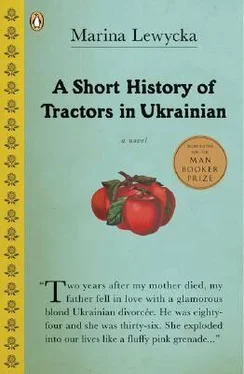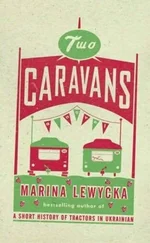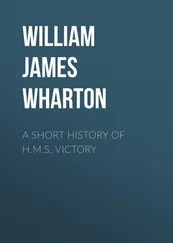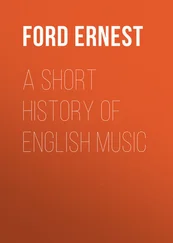“Hmm.” He picks up the J-cloth and absent-mindedly wipes his forehead with it. “Hmm.”
I realise that this thing with Valentina isn’t really about ideology.
“So when will we get a chance to meet her?”
“She should come here when her shift finishes, about five o’clock,” says my father. “I have something to give her.” He reaches for a fat brown envelope on the sideboard which appears to be stuffed with papers.
“Well why don’t I just pop out and get your shopping? Then we can all have tea together when she comes back.” Cheery, sensible voice. English voice. Distances me from all the pain and madness.
On the way back from the supermarket, I pull up outside the nursing home where Valentina works. It is the same nursing home where my mother came briefly before she died, so I know the lie of the land. I park outside on the road, and then, instead of going in through the front door, I go round the side and look in through the kitchen window. A fat middle-aged woman is stirring something on the stove. Is it her? Next to the kitchen is the dining-room, where some of the older residents are gathering for tea. A couple of bored teenagers in pinafore overalls are shoving them around in wheelchairs. There are other people with trays of food, but they are too far away to see. Now some people are coming out through the front door, and making their way to the bus stop. Are they staff, or visiting relatives? What am I looking for, anyway? I am looking for someone like my father’s description-a beautiful blonde with an enormous bust. No one like that here.
When I get home, my father is in a state of distress. She has telephoned to say that she isn’t coming. She is going straight home. Tomorrow she travels back to Ukraine. He must see her before she goes. He must give her his gift.
The envelope is not sealed, and from where I am sitting I can see that it contains several sheets of paper covered with the same crabbed handwriting, and some banknotes. I cannot see how many. I feel rage rise in me. Red blood swims before my eyes.
“Pappa, why are you giving her money? You have little enough from your pension to live on.”
“Nadezhda, this is absolutely none of you business. Why you so bothered what I am doing with my money? You thinking there will be none left for you, hah?”
“Can’t you see she’s conning you, Pappa? I think I should go to the police.”
He catches his breath. He is scared of the police, the local council, even the uniformed postman who comes to the front door every day. I have frightened him.
“Nadezhda, why you are so cruel? How I have raised such a hard-hearted monster? Leave my house. I never want” (vant) “to see you again. You are not my daughter!” Suddenly he starts to cough. His pupils are dilated. There are flecks of saliva on his lips.
“Oh, stop being so melodramatic, Pappa. You said that to me before-do you remember? When I was a student and you thought I was too left-wing.”
“Even Lenin wrote that left-wing communism is infantile.” (Cough cough.) “Infantile Disorder.”
“You said I was a Trotskyist. You said ‘Leave my house I never want to see you again!’ But, look, I’m still here. Still putting up with your nonsense.”
“You were Trotskyism. All of you student revolutionaries with your foolish flags and banners. Do you know what Trotsky did? Do you know how many people he killed? And in what a manner? Do you? Trotsky was a monster, worse than Lenin. Worse than Vera.”
“Pappa, even if I was a Trotskyist, which by the way I was not , it was still an unkind thing to say to your daughter.”
That was more than thirty years ago and I can still remember the shock of hurt-I who had always believed until then that my parents’ love was unconditional. But it wasn’t really about politics; it was about will-his will against mine: his right to command me, as my father.
Mike intervenes.
“Now, Nikolai, I’m sure you didn’t mean that. Now Nadezhda, there’s no need to rake over past disputes. Sit down, both of you, and let’s talk about it.”
He’s good at that sort of thing.
My father sits down. He is shaking, and his jaw is clenched. I remember that look from childhood, and I want to punch him, or to run away.
“Nikolai, I think Nadezhda has a point. It’s one thing to help her to come to England, but it’s another thing if she’s asking you for money.”
“It’s for her tickets. If she is to come back, she needs money for tickets.”
“But if she really cares about you, she’ll come and see you before she goes, won’t she? She’ll want to say goodbye,” says Mike.
I’m not saying anything. I’m keeping out of it. Let the old fool go to hell.
“Hmm. This may be so.”
My father looks upset. Good. Let him be upset.
“I mean, it’s understandable that you should feel attracted to her, Nikolai,” says Mike. (What’s this? Understandable? We’ll talk about this later.) “But I think it’s a bit suspicious, that she won’t meet any of your family, if she’s really thinking of marrying you.”
“Hmm.” My father doesn’t argue with Mike the way he does with me. Mike is a man and must be treated with respect.
“What about the money she’s been earning with all her jobs? That should be enough for the tickets.”
“She has some debts to pay. If I don’t give her money for tickets, maybe she will never come back.” There is a look of utter loss on his face. “And some poems I have written for her. I want her to read.” I realise, and Mike realises in the same moment, that he is completely in love. The stupid fool.
“Well, where does she stay in Peterborough?” asks Mike. “Maybe we could call round at her house.” He is as worried as I am now. And maybe intrigued.
We pile into the car, all three of us. Father has put his best jacket on, and tucked the brown envelope into the inside breast pocket, next to his heart. He directs us to a narrow street of terraced red-brick houses near the centre of the city. We pull up outside a house with a wicket gate and a crumbling tarmac path leading up to the door. My father is out of the car in a trice, and hurrying up the path, clutching the envelope in front ofhim.
I see him dispassionately for a moment, and I am struck by how old he is, how bent and shuffling his gait. But his eyes are aflame. He rings the bell. There is no reply. He rings again. And again. And again. Longer and longer. After a long while, there is a grating sound of a sash window being opened. My father looks up eagerly. He is holding out the envelope. His hands are shaking. We all hold our breath, expecting to see a beautiful blonde with an enormous bust, but instead, a man pokes his head out of the window. He is maybe forty, with a fuzz of brown hair and a white shirt, open at the neck.
“Piss off, will you? Just piss off!”
My father is speechless. He extends the envelope with his trembling hands.
The brown-haired man ignores it.
“Don’t you think you’ve caused enough trouble already? First the letter from the solicitor, then pestering her at her work, now following her home. You’ve upset her. Now just piss off and leave her alone!” He slams the window shut.
My father seems to shrink and crumple on the spot where he stands. Mike puts an arm round his shoulder and leads him back to the car. When we get back to the house, he can barely speak.
Mike says, “I think you had a lucky escape there, Nikolai. Why don’t you put the money back in the bank tomorrow, and forget about her.”
My father nods dumbly.
“Do you think I am so very foolish?” he asks Mike.
“No, no,” says Mike. “Any man can lose his head over a beautiful woman.” He catches my eye and gives me a little apologetic smile.
Читать дальше












